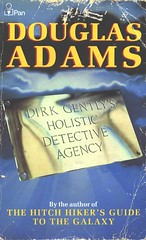Dirk Gently's Holistic Detective Agency
Everyone and his grandmother have now read
The Hitchhiker's Guide to the Galaxy, and those who haven't have seen the film or heard the radio show. They made Douglas Adams the icon he is, and ensured that my mother recognises his name. Dirk Gently, however, is more of an unknown entity in the world of nutty literati and grandmothers alike. Rather undeservedly; it should be remedied.
Adams once wrote occasional episodes for the magnificent television series
Doctor Who (and some of the better episodes at that). When, from time to time, the scripts did not pan out, he was known to convert them into pieces of books (see the Krikkit robots and the incident with the ashes, for example).
Shada, which was left unfinished and unaired because of a strike, is one such, and Adams converted key bits of it into the strange composition of insanity, absurdity, hilarity and very, very close plotting which is
Dirk Gently's Holistic Detective Agency.
The Doctor does not figure in it. Instead the reader must deal with the strange workings of the very odd minds of Professor Chronotis (Reg), and his cryptic comments, very strange behaviour and impressive magic tricks; and Dirk Gently, with his very strange hat, penchant for massive amounts of free pizza, and his tendency to notice things. The hat is very strange.
Dirk Gently is a holistic detective, which means he will use his gifts to find the missing cat by visiting Bermuda -- for holistic reasons, you understand. And he never gets paid. And he went to school (and by "school" I mean Cambridge, as you do) with Richard. And was kicked out for correctly divining the correct questions of an exam. Down to the smallest comma. By accident.
Richard is more boring (despite having an interesting sofa), but serves as the hub around which all the crazy happens. You see, Adams takes The Interconnectedness of All Things very seriously. So a lot of crazy has to happen in order to reveal itself as interconnected. And it is strangely disorienting when you are in the middle of it. And then, two weeks after you put the book down, you go "Ah! Right! I get it now". Or that is what I suspect. The first time I read it I read it twice in two days because I need to know that things fit. And they did. I read it again, now, after 12 years or so (with
very fuzzy memories from the last time), and it took me a while to stop going "ah, yes,
that was why he included that bit" once I had finished the book.
There is a lot of technobabble. It is 1980s technobabble from Adams, which means it is weirdly mac-centered in a strange unworldly kind of way and may induce bouts of nostalgia in geeks (or, indeed, people who were old enough to know state of the art technology in 1987). Be warned.
.
More importantly (as I see it), it pokes and prods literary and musical history in just the right places and will reward anyone familiar with key Coleridge poems. It might also help you appreciate Bach's Mass in B Minor from the Brandenburg Concertos in a new way.
And the extinction of the dodo is explained
It is very much a Douglas Adams book. The weirdly absurdist carnivalesque style and the perfect wording that makes apparent True Meanings of things and which are characteristic of a certain type of British writing -- it is all here. People who like it, will; those who don't … well, I can't help you.


Comments